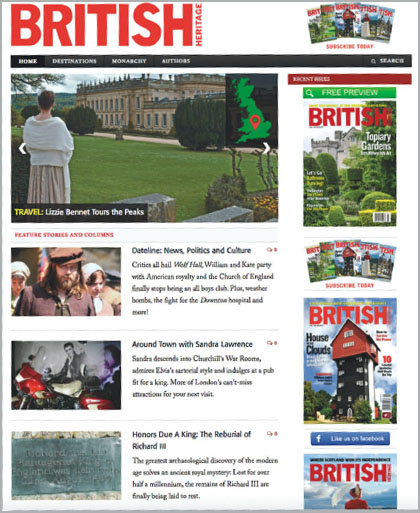
[caption id="WaftingintheWindsofChange_img1" align="aligncenter" width="193"]

PLUS CA CHANGE; PLUS C’EST LA MEME CHOSE. The more things change, the more they stay the same. You may have noticed some changes in British Heritage. Our new grade of paper stock is designed to enhance the look of our photography. We’ve added more pages, and a new bimonthly folio on the cover. That’s just a blackcurrant in the plum duff, however.
British Heritage has a new publisher. No longer a part of Weider History Group, our magazine is now the jewel in the crown of Kliger Heritage Group. The magazine and I have been enthusiastically acquired by Jack Kliger, an experienced magazine publisher, who has always had a great appreciation for British Heritage and its loyal audience of readers. That would be you.
For the first time in the magazine’s 35 years, British Heritage is charting its own course as an independent publication. Jack Kliger is giving the magazine the attention and investment required to create even more print and online content in the future. It’s an exciting ride for me to be on.
Nowhere is our change of fortune more apparent than on the magazine’s first dedicated website: www.BritishHeritage.com. Still a work in progress, over the next few months the site will include all the editorial content of British Heritage’s last 10 years, thoroughly indexed, and searchable by theme and topic. That’s a tremendous boon and tool for veteran readers like us. No longer will we have to find room to archive and keep all our old back issues. When you recall that story I did on the Wesleys at Epworth a few years ago and want to find it, the search will take seconds online—instead of pawing through the ToCs of back issues. Technology marches on.
[caption id="WaftingintheWindsofChange_img2" align="aligncenter" width="420"]

New web content can be interactive, too, and we are beginning to include audio interviews with our team of authors, such as Sian Ellis and Sandra Lawrence. I am chatting a bit as well. Do visit British Heritage on line and watch us grow. For the first time, also, since 2001, there has been a comprehensive subscriber survey of British Heritage readers. Perhaps you were invited to take part. The media company who was retained to design and evaluate the results was quite amazed. Congratulations.
Our readers really are unusually loyal; many of you have been with British Heritage for years (and I thank you humbly). Even better, almost everyone who subscribes actually reads most or all of the magazine. And for that, there are many people to thank, including our enthusiastic writers such as Scott Reeves, Jennifer Dorn, Forbes Inglis and James Graham. If you would like to read the highlights of our Reader Survey, you can find it on the website (look under Advertising).
In our transition to Kliger Heritage, just before Christmas I relocated self and our editorial office (including 17 cases of British Heritage archives) from Lees-burg, Virginia to Exeter, New Hampshire. It was the wrong winter to come north to seacoast New England. We had seven and a half feet of snow from late January, and it was the coldest February in N.H. recorded history.
[caption id="WaftingintheWindsofChange_img3" align="aligncenter" width="1024"]

REX USA
Somehow, though, the 17th and early 18th-century colonial towns of coastal New England seem to be a more fitting natural home for British Heritage than was a lovely Potomac Valley center of Civil War history. There’s a reason it’s called New England. Exeter was settled in 1638 and, like towns along the coast from here across southern Connecticut, has a distinctly British heritage still recognizable today in their colonial architecture and town planning, economic history, institutions and local culture.
Meanwhile, Spring has finally arrived. On my coming editorial adventures in our sceptered isle, I am heading to the Cornish peninsula to begin a new feature series for coming issues. Then, I will be crossing beautiful Dorset to revisit Dorchester and Thomas Hardy Country. From there, it may be Bristol and Chepstow, and so to London and thereabouts. Or not.
Campaigning ahead of June’s Parliamentary elections is in full swing. This is rather uncharted ground for British politics. With a 5-year, fixed-term Parliament, Britain has a predictable and long campaign season for the first time. The political atmosphere has moved toward America’s lengthy electoral feeding frenzy, and a number of veteran American political operatives have found employment with U.K. parties and interests.
Increasingly, it looks like the U.K. will not be able to avoid a hung parliament. With the fracturing of support across as many 10 political parties, any single party’s parliamentary majority becomes highly unlikely. The vast majority of Labour’s Scottish seats are now universally expected to fall to the Scottish National Party, ending any hope that Ed Milliband and Labour could have of unshared power in Westminster. So, David Cameron has tossed in a teaser, and declared himself in favor of lifting the ban against fox hunting. A decade after Labour made the centuries-old country pursuit of fox hunting illegal, the prohibition still rankles across the rural shires.
To country folk, the fox hunting ban has been more than just an unwarranted government elimination of the sport. It represents the power of an urban populace who want a picturesque countryside to visit on long weekends, but who don’t understand rural life and wouldn’t like it if they did. At a practical level, farmers know they’ve got to control predator foxes one way or another. The P.M. has pledged that if elected, he’ll offer a free vote in the Commons to repeal the hunting ban. Yes, it certainly is a move going after the country vote.
This will be an interesting time to be in Britain. However these winds may blow in Westminster, or in British Heritage as we grow, some things may change, but much remains steadfast. The unique voice of the magazine, and the broad mixture of stories on British heritage travel, history and culture we explore, will remain firm as the throne of Britain. After all, our reader survey clearly told us: we’ve got the right stuff!
As for where those winds may blow me from Dorset next month, I will invite you along for the ride in our next issue as usual. We are indeed always spoiled for choice!
[caption id="WaftingintheWindsofChange_img4" align="aligncenter" width="1024"]

REX USA










Comments